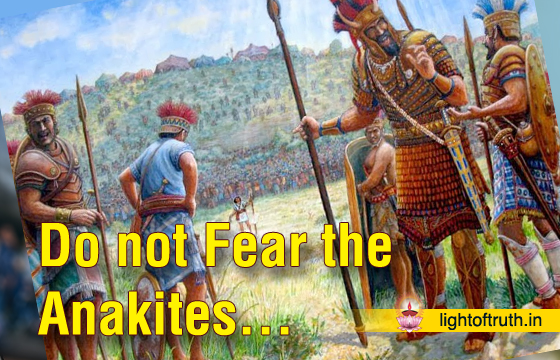Azadi ka Amrit Mahotsav Kolkata event honours four Clergymen
Pope Francis asks businesses to support working women: They’re ‘afraid to get pregnant’
Study: Christianity may lose majority, plurality status in U.S. by 2070
Indian politician declines Magsaysay Award under party pressure
Like John Paul II, Pope Francis heads to Kazakhstan during time of war

Jacob Chanikuzhy
At its best fear can save us from dangers, and at its worst fear can prevent us from accomplishing our dreams. And, the worst happened with the Israelites. Their fear of Anakites prevented them from possessing the Promised Land in time.
Who were the Anakites and why were the Israelites afraid of them? Anakites were believed to be the descendants of Anak, a giant like the giants in the race of Nephilim and Rephaim. In the midrash, there is an interesting story that describes the Anakites and compares them with Israelites. The daughter of Anak was eating a pomegranate. When finished eating it, she threw its crust in the garden and left the place. It was at this time the twelve Israelite spies entered that garden. However, seeing Anak himself, these spies were afraid and they hid themselves inside the skin of the pomegranate, thinking that it was a cave. Later, the daughter of Anak returned to the garden. When she saw the skin lying in the garden, she threw it outside of the garden. Although the twelve spies were still inside that skin, she neither noticed them nor felt the additional weight of the twelve spies!
Rabbinic literature indicates that these Anakites were so tall that their head appeared to press against the sun and they were so heavy that they made deep furrows on the earth with every step they walked. No wonder, the Israelites were afraid of entering the land of Anakites.
God had promised the land of Canaan to the Israelites. For the Israelites, it was to be a land of freedom and prosperity. A land for themselves, ruled by their own kings, was beyond all their imaginations. In fact, they or their forefathers had never possessed a land for themselves. All throughout their history, they were, nomads or people settling with other tribes and peoples. The freedom which God offered the Israelites in Egypt, was primarily a freedom for religious worship (“Let my people go, so that they may worship me” (Exodus 8,1). In order to acquire this freedom, first of all they had to be liberated from the tyranny of Pharaoh. Since the mighty and arrogant ruler of Egypt would not listen neither to the words of Yahweh nor to Moses and Aaron, God had to strike Egypt with the plagues in order to liberate his people from Egypt. The people of Israel had almost nothing to do to punish Pharaoh. Neither were they capable of doing anything against Pharaoh who wielded power in the name of the Egyptian gods. Yahweh did it all alone to bring Pharaoh to his knees. It is by overpowering Pharaoh and his gods that God brought his people out from Egypt, the land of oppression. Thus, God brought Israel to the boarders of the promised land. At the boarder God wanted them to head to the promised land. At least they had to do something, viz., they had to walk in confidence to the new territory. But they were afraid. Thus, in a tragic turn of events they lost what they were hitherto dreamt and strived for – the promised land, the land flowing with milk and honey, the land of freedom, the land where they can worship their God the way they wanted. They lost it all just because of their fear of Anakites. They were afraid of the prospect of making war with the Anakites. They were afraid of risking their lives for a noble cause.
Although Anakites were tall and mighty giants, God wanted Israelites to enter that land to enjoy the goodness, freedom and prosperity. However, among the twelve spies there were only two – Joshua and Caleb – who encouraged the Israelites to fight for their future (Numbers 13,30). The majority of the spies terrified them with the thought of the aftermath of the fight and convinced them that a life of slavery was far better than a freedom struggle.
The Anakites of various forms still do the rounds cowing people to slavery, injustice and exploitation in political, social, cultural, economic and religious levels. However, God is a God of freedom, justice and peace. It is up to the real believers to trust in God and face the Anakites that degrade them and devoid them of their right to enter the promised land where they can live in solidarity with each other, and worship God with freedom, fraternity and peace.
Leave a Comment